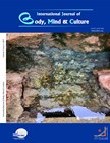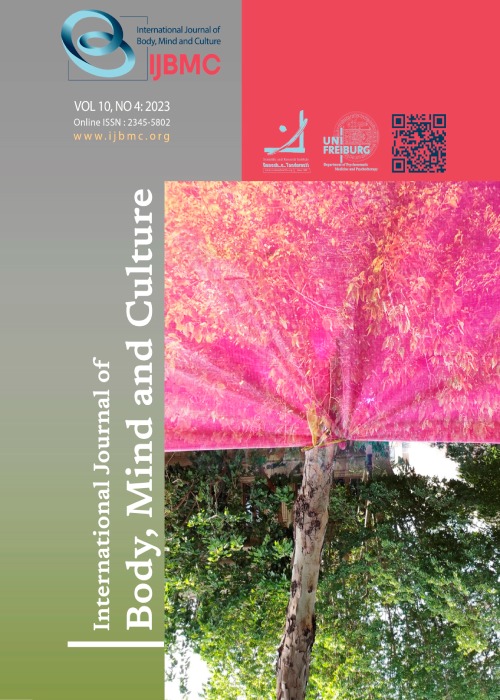فهرست مطالب

International Journal of Body, Mind and Culture
Volume:8 Issue: 3, Summer 2021
- تاریخ انتشار: 1400/05/19
- تعداد عناوین: 7
-
Pages 154-163Background
Due to the high prevalence of multiple sclerosis (MS) in the country and the mental and physical constraints resulting from it, applying psychological interventions to overcome and improve the limitations patients, who are often of a young age (with an average age of 20-40), are faced with in their lives seems essential. Although MS is a progressive autoimmune disease, its mental symptoms can affect many aspects of life. The aim of this study was to investigate the effect of the self-review method on life satisfaction, efficacy, and quality of life (QOL) of MS patients.
MethodsThis study evaluated the effectiveness of the "self-review" method as a cognitive intervention in improving efficacy and QOL in patients with MS through a semi-experimental design with a pretest-posttest design and control group. Through convenience sampling, 26 members of the Iranian MS Society (12 women and 14 men) were selected and were randomly divided into control and experimental groups (each group containing 13 subjects). After responding to the Multiple Sclerosis Self-Efficacy Scale (MSSS) and Multiple Sclerosis Quality of Life (MSQOL-54) questionnaire, the experimental group received therapy sessions based on the "self-review technique" for about 3-4 weeks. The control group did not receive cognitive therapy.
ResultsTo evaluate the difference between the obtained scores, the self-review method was considered as the independent variable, and self-efficacy and QOL (a combination of physical and mental health) were considered as dependent variables. The results from the slope of regression lines on the combination of physical health (P < 0.001; F = 19.29; df = 24) and mental health (P < 0.001; F = 13.34; df = 2) indicated that the slope of the regression lines was not homogeneous. The findings of this study indicated that using the self-review treatment method in individual counseling sessions improved self-efficacy and QOL in MS patients. This method positively changed patients’ perception of their physical health, and improved their mental health.
ConclusionThe results show a meaningful change in self-efficacy and QOL in patients with MS who have undergone the therapy sessions. In this study, we concluded that the psychological intervention with a self-review method is effective in improving the level of self-efficacy in MS patients. It can be stated that the self-review method consists of a psychological intervention, which positively affects the perception of patients by decreasing the psychological energy spent for negative events through content and feelings reflection technique, as well as promoting their level of self-awareness. Thus, the intervention can promote the QOL of patients, which in turn affects their perception of the disease.
Keywords: Multiple Sclerosis, Self-Efficacy, Quality Of Life, Self-Review Technique -
Pages 167-174Background
Stressors among medical students have been observed as a pervasive problem in recent times. This has continued to be a devastating challenge affecting students’ academic performance as well as their general well-being. The main objective of this study is to examine the factors that cause stress among first-year undergraduate medical students at a Nigerian private university.
MethodsA descriptive cross-sectional study design was used. An adaptation of the Burge University Student Stress Scale was used to develop the questionnaire. 224 first-year medical students enrolled in the College of Medicine and Health Sciences of Afe Babalola University, Ado-Ekiti, Nigeria, were sampled. Data were collected and analysed using SPSS software.
ResultsThe mean age of the students was 17.30 ± 1.05 years. The majority were girls (72.2%), Christians (85.8%), less than 18 years old (69.8%), and received a monthly allowance of less than 60000 (85.4%) Nigerian Naira (₦). Getting good enough grades for the next level (65.1%), fear of failure (67.0%), fear of disappointing the family (62.8%), getting access to the internet (57.5%), food served at the university cafeteria (67.0%), electricity supply (61.3%), and water supply (71.7%) were some of the stressors identified.
ConclusionThis study found the number of materials to study, getting good enough grades for the next level, fear of failing, and disappointing family amongst others as sources of stress among first-year medical students.
Keywords: Stress, Medical Student, Cross-Sectional Study, University, Nigeria -
Pages 186-192Background
Psychosomatic medicine is a systemic model of care based on the biopsychosocial model in which the physical, emotional, and social aspects of clinical conditions are considered. Family Medicine (FM) and psychosomatic medicine have many similarities in their community-based and family-based approaches. Studies have shown the necessity and effectiveness of psychosomatic medicine training for general practitioners (GPs) and family physicians.
MethodsWe designed a psychosomatic course for FM residents. This semi-experimental study was performed at Isfahan University of Medical Sciences, Iran, in 2018. The target population included 11 FM residents. A compact 20-hour module (4 days, 5 hours each) was designed for the training. The Knowledge and Practice of Psychosomatic Medicine Questionnaire (self-administered) for the concepts and skills of psychosomatic medicine was filled out by each of the FM residents before and after the intervention. For each resident, caring for patients was monitored and a Performance Appraisal Checklist was completed by the supervisor. Finally, the questionnaire scores before and after the intervention were compared using paired t-test.
ResultsThe total knowledge and practice score increased significantly after the intervention (258.5 ± 40.3 vs. 174.6 ± 62.9; P = 0.002). There was also a significant increase in the mean psychosomatic care performance scores after the intervention (28.65 ± 3.52) compared with baseline (21.18 ± 5.94) (P = 0.001).
ConclusionThis study showed that basic psychosomatic care training for family physician residents, even in short courses, can have a positive effect on their clinical knowledge and performance.
Keywords: Psychosomatic Medicine, Family Practice, Residency, Curriculum -
Pages 193-202Background
The aim of the present study was to compare the effects of stress inoculation and positive psychology on depression in pregnant women with mitral valve prolapse (MVP).
MethodsThis research falls among semi-probationary plans, with pretesting and posttesting in 2 experimental groups, and follow-up. The statistical population of the study included all pregnant women with MVP referred to Imam Khomeini Hospital in Tehran, Iran, in 2019. To form 3 groups, 45 people were first selected using purposeful sampling method (considering the inclusion and exclusion criteria). Then, 15 people were assigned to the first experimental group, 15 people were assigned to the second experimental group, and 15 people were assigned to the control group. The 3 groups were homogeneous and the dependent variable was measured in the experimental groups simultaneously. Moreover, the follow-up stage was performed on all 3 groups 3 months after the posttest. The research instrument was the Beck Depression Inventory (1989).
ResultsThe collected data were analyzed using mixed analysis of variance (ANOVA). The results of data analysis showed that stress inoculation and positive psychology had a significant effect on reducing depression in pregnant women with MVP in the experimental groups compared to the control group (P < 0.05). Furthermore, the effects of stress inoculation and positive psychology on reducing depression were not different (P > 0.05).
ConclusionThe results showed that immunization against stress and positive treatment have a significant effect on improving psychological well-being and depression in pregnant women with MVP. There was no significant difference between the methods of immunization against stress and positive treatment in terms of their effect on depression.
Keywords: Stress Inoculation, Positive Psychology, Depression, Pregnant Women, Mitral Valve Prolapse -
Pages 203-213Background
HIV is one of humanity's greatest challenges and major health risk factors. Therefore, this study aimed to design a community-based model of adjustment methods for positive prevention based on perceived deterioration and treatment adherence mediated by coping strategies in HIV-positive patients.
MethodsThe present study was a correlation study with a structural equation modeling design. The statistical population included all HIV-infected patients in Tehran, Iran, of which 250 people were selected as a sample from the patients referred to positive clubs under the supervision of the Welfare Organization. The Ways of Coping Questionnaire (WCQ), Psychosocial Adjustment to Illness Scale (PAIS), and Brief Illness Perception Questionnaire (IPQ) were used to collect data. The proposed model was evaluated using structural equation modeling method, and bootstrap method (AMOS software) was used to test indirect relationships.
ResultsThe proposed model after the correction has an acceptable fit with the data. All direct paths are statistically significant. Moreover, all indirect pathways (relationship of adjustment methods for positive prevention, perceived deterioration, and treatment adherence through coping strategies) were significant (P < 0.001).
ConclusionPerceived deterioration and adherence treatment have a direct effect on psychosocial adjustment in HIV-positive patients. Coping strategies also have a direct effect on psychosocial adjustment in HIV-positive patients.
Keywords: HIV, Adaptation, Treatment Adherence, Compliance


